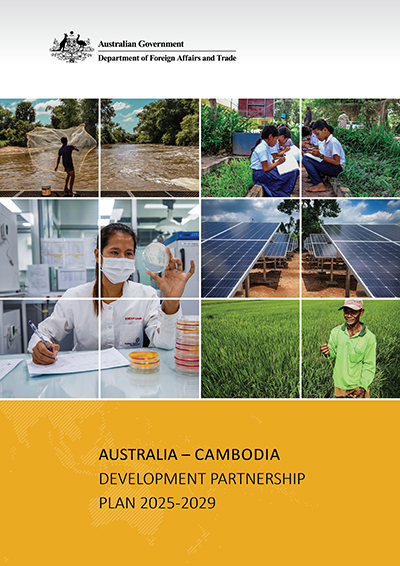Development assistance in Cambodia

-
2025-26 bilateral allocation [budget estimate]
-
$49.9 million
-
2025-26 total Australian ODA [budget estimate]
-
$87.8 million
-
2024-25 bilateral allocation [budget estimate]
-
$48.9 million
-
2024-25 total Australian ODA [budget estimate]
-
$83.7 million
-
2023-24 total Australian ODA [actual]
-
$82.2 million
Australia and Cambodia are close neighbours and long-standing partners. Since helping to bring peace to the country in the early 1990s, Australia has provided over $2 billion in development assistance. Our partnership is underpinned by strong and enduring institutional, and people-to-people links.
Joint Objectives of the Australia–Cambodia Development Partnership
The overarching goal of the Australia–Cambodia development partnership is a prosperous, resilient, and stable Cambodia where all citizens can participate in and benefit equally from economic and social progress.
The Australia–Cambodia Development Partnership Plan 2025–2029 translates into action the development priorities Australia shares with Cambodia. It outlines agreed objectives, how we will work together to deliver shared outcomes, and how progress will be monitored.
Objective 1: Stronger Institutions and Better Governance
Australia will support Cambodia in building resilient, transparent, and accountable governance, which is the foundation for long-term stability and prosperity. This will include strengthening evidence-based policymaking processes, inclusive public policy, and institutional leadership.
Australia will continue to build leadership capacity through scholarships, technical exchanges, and partnerships. Our collaboration will address transnational challenges, such as human trafficking, cyber security, and transnational crime, by working closely with Cambodian law enforcement and governance agencies.
Cambodia's development trajectory faces challenges from climate-related and socio-economic shocks. Australia will support the integration of climate resilience and adaptation strategies into Cambodia's governance frameworks, safeguarding the country's development from future disruptions.
Objective 2: Public Services Are More Inclusive
Australia is committed to strengthening Cambodia's public services to ensure they are inclusive, equitable, and accessible to all citizens.
Australia will support Cambodia's journey towards Universal Health Coverage by focusing on health system resilience, improved social protection systems, and enhanced access to water, sanitation, and hygiene services. Our efforts will also address non-communicable diseases and malnutrition, which are critical barriers to long-term human capital development.
Gender equality is central to this partnership. Australia will continue supporting initiatives to address gender-based violence, promote women's empowerment, and ensure public services are accessible to all, particularly marginalised groups such as people with disabilities, ethnic minorities, and LGBTQIA+ individuals.
Objective 3: A More Resilient, Inclusive and Sustainable Economy
Australia will partner with Cambodia to build a resilient, inclusive, and sustainable economy Australia will work with Cambodia to foster commercial links and trade.
Australia will support Cambodia's efforts to create a more enabling environment for business and investment, with a focus on high-quality, sustainable growth. This will involve promoting economic reforms that enhance the competitiveness of Cambodian businesses, attract foreign investment, and drive diversification into sectors such as agriculture, technology, and renewable energy. Australia's flagship economic development program will play a key role in these efforts, helping Cambodia strengthen its regulatory frameworks, improve infrastructure, and expand its capacity for innovation.
Climate Change
Cambodia is one of the world's most climate-vulnerable nations, facing frequent floods, droughts, and other extreme weather events. Australia will strengthen Cambodia's climate resilience through investments in clean energy, sustainable agriculture, and disaster preparedness.
A new climate investment starting in 2025 will integrate climate resilience and adaptation, building on Australia's long-standing support for water resource management. This partnership will support Cambodia's ambitious climate commitments, including reducing emissions by 41.7 per cent by 2030 and achieving carbon neutrality by 2050.
Gender Equality, Disability, and Social Inclusion (GEDSI)
Gender equality and social inclusion are at the core of the Australia–Cambodia Development Partnership Plan. Australia will implement a twin-track approach to GEDSI, integrating these principles across all investments while supporting targeted interventions for women, people with disabilities, and other marginalised groups.
By working with local organisations, Australia will support initiatives to empower women, enhance leadership opportunities, and improve access to inclusive services. Addressing gender-based violence and strengthening advocacy for disability rights will remain priorities. These efforts aim to ensure all Cambodians can participate in and benefit equally from the country's development.

